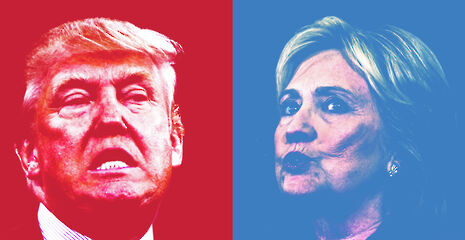Cambridge wrestles with spectre of Trump victory
Multiple venues played host to debates over the future of America after 8th November

Several events in Cambridge over the last week have focused on Tuesday’s upcoming American presidential election. Many have centred on the candidacy of Republican nominee Donald Trump, amid opinion polls suggesting that the election will be extremely tight.
The first of these events was last Monday’s debate at King’s Politics Society, entitled ‘Does Trump have a point?’, which saw a number of politics academics joined by journalists and peers to discuss the merits of the GOP nominee’s campaign.
Dr Chris Brooke, a Politics Fellow at Homerton, contended that though Trump represented a “threat to the republic” and embodied many qualities seen in Latin American strongmen leaders, he nevertheless echoed the anger widely felt against both parties. In particular, Brooke contended that Trump was “call[ing] bullshit” on the “folksiness” that he claims the Democratic and Republican party establishments use to conceal what is essentially elite control of the political process. Spectator deputy editor Freddy Gray drew parallels between Trump’s campaign and the success of Jeremy Corbyn in the UK, arguing that they both represented a “cult of leadership” based on the insurgency of a “strange figure that nobody thought could win”. Speculating that he may have entered the race to help his business, Gray nevertheless concluded that “Trump has destroyed the Republican Party and that is no bad thing”.
Helen Thompson, Professor of Political Economy at Clare, emphasised Trump’s potent critiques of both US foreign policy and also the corruption she believes is endemic at all levels of US government. Quoting President Jimmy Carter, she argued that Trump was correct in asserting that there is something “fundamentally rotten” in the operation of both parties. She highlighted the increasingly dynastic character of American politics, as well as the conflicts of interest created by the Clinton Foundation should Hillary win, to demonstrate the ways in which Trump represented a reaction to Washington politics.
Thursday night saw the Union play host to a motion proposing that ‘This House Has No Confidence In The American Electorate’. The proposition’s case was opened by barrister Lucas Fear-Segall, who argued that the “deep strain of racism” in the American electorate was partly responsible for them having “made a series of singularly poor decisions”, including so many of them voting for Mitt Romney after electing Obama, whom he termed “transformative”, in 2008. He also pointed to America’s militarism, which extended beyond “arming themselves to the teeth” to “equipp[ing] their police with military hardware and tacitly instructing them to shoot young black men on site” as evidence for their lack of trustworthiness.
The other propositions speakers, Reading University’s Dr Mark Shanahan and Politics undergraduate Connor MacDonald, both emphasised the poor choice of candidates chosen by the American electorate. Shanahan branded the Republican nominee an “orange, thin-skinned, narcissistic pensioner” while calling Clinton the “apogee of Washington insiderism”, while MacDonald looked to President Obama having “utterly failed to manage expectations” as an explanation for the rise of Trump and Clinton.
The opposition sought to place the decision to choose the parties’ nominees in context. Their first speaker, Republican tax executive Alex Sunderstorm, emphasised wage stagnation, citing “globalism and advanced technology” as a reason workers might vote for Trump. Comparing Trump’s nomination to Brexit, Sunderstorm argued that only Trump, who is not controlled by special interests and donors, could break the grip of elite politics in Washington that had harmed workers. Dr Nina Ansary, a women’s rights expert and bestselling author, highlighted not only how the candidates were both deeply unpopular with the American electorate but how they were chosen by selective primary processes that privileged certain groups over others. She said: “Does the average American voter really want either of these individuals to occupy the Oval Office? The research indicates a resounding no”.
 Features / Should I stay or should I go? Cambridge students and alumni reflect on how their memories stay with them15 December 2025
Features / Should I stay or should I go? Cambridge students and alumni reflect on how their memories stay with them15 December 2025 News / Dons warn PM about Vet School closure16 December 2025
News / Dons warn PM about Vet School closure16 December 2025 News / Cambridge study finds students learn better with notes than AI13 December 2025
News / Cambridge study finds students learn better with notes than AI13 December 2025 News / News In Brief: Michaelmas marriages, monogamous mammals, and messaging manipulation15 December 2025
News / News In Brief: Michaelmas marriages, monogamous mammals, and messaging manipulation15 December 2025 Comment / The magic of an eight-week term15 December 2025
Comment / The magic of an eight-week term15 December 2025










